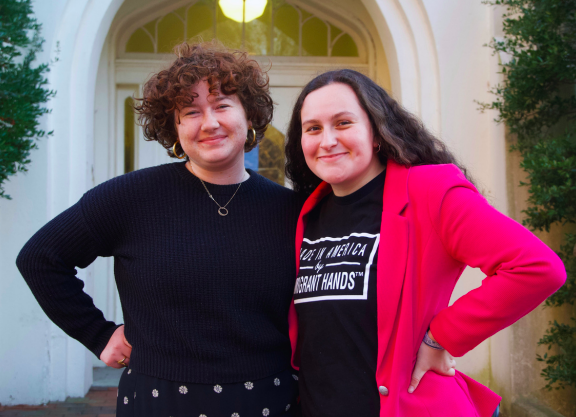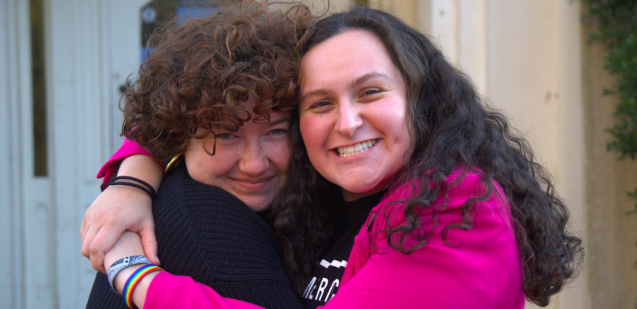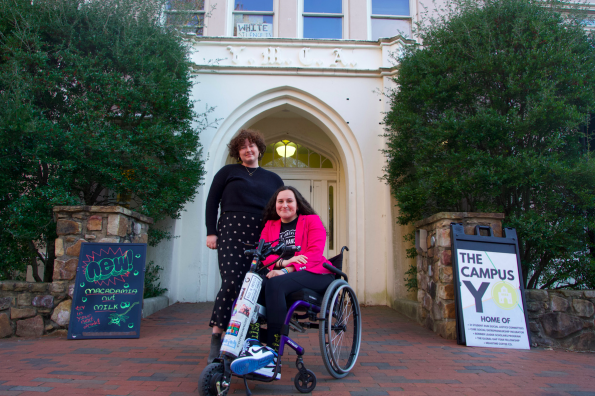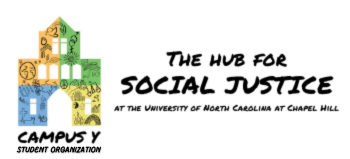Laura Saavedra Forero and Megan Murphey elected Co-Presidents of the Campus Y for 2022-2023
March 30, 2022 • dlovere • No Comments
Earlier this March, Laura Saavedra Forero (’25) and Megan Murphey (’23) were elected Co-Presidents of the Campus Y for the 2022-2023 school year.
We spoke with Laura and Megan about their plans to completely restructure the Campus Y, address collective trauma and burnout on campus, and the importance of putting people first in social justice work.
This interview has been edited briefly for length and clarity.
Q: Why did you decide to attend UNC?
MM: My dad is a UNC alum and, honestly, I don’t think I would’ve applied to come here at all if the Campus Y didn’t exist. So, I kind of credit the Campus Y with being here.
LSR: I will say the Campus Y, it was a big reason. I never had this type of community in high school and it’s something I always yearned for. And being introduced to this space before I came here—it solidified my choice. I think the idea of Carolina being a big public school that could introduce me to all sorts of people and perspectives was also a big draw.
Q: How were you introduced to the Campus Y before you came to Carolina?
MM: My first like introduction to the Y, I credit with being a sophomore visiting campus with my dad and seeing the students protesting Silent Sam. It was a cold and rainy day and there were all these people sitting around this statue diligently. I learned about the Campus Y through following that story and seeing Silent Sam come down. And that really solidified that the Campus Y is a space I want to be part of.
LSR: I did the whole college application process during COVID and didn’t visit most schools I applied to, including Carolina. So, I was actually on a call with Patrice about a month after she had become Co-President and wanted the honest experience of what it’s like being a woman of color at UNC and obviously the Y came up and all that it does and all that it stands for. And so that conversation really drew me to it. And then when I first got to campus, apart from my dorm, it was basically the first building I came to.
Q: When did you first become directly involved with the Campus Y?
LSR: I was the annoying first year who went to all of the Y’s events the first week of class. Megan knows because she organized them all. So, I knew I wanted to get involved. The first, direct thing I did was get involved with FYC, which is First Year Council, to better understand my role in organizing and community work at Chapel Hill and as a college student and knowing how to go about that in an ethical way, knowing that I just entered the space and I will be leaving it soon. After that, I started joining different committees like CJAA and then I applied to be an I was able to join Exec.
MM: I was also introduced to the Y and first got involved by joining FYC when I was a first year. And then pretty quickly after that, I started getting involved with CJAA and joined CJAA Exec my sophomore year. And then from there I became Director of Membership. And so, I got to be leading FYC which was a really great experience.
Q: You spoke a little bit about this in your platform, but how will your work from CJAA influence your role as Co-Presidents?
LSR: I’ll say the foundation of our platform is abolition and abolitionist principles and values of decentralization and horizontality such as abolishing titles and really taking a community first approach. And so, I think at the core, the work that CJAA does and the way that I feel in that space is something that I want to emulate so that more students can experience it, especially in the greater Y community. And this idea of healing can only take place when we allow time for it and we also allow the space for it. So, the community centeredness is what we are trying to accomplish, with wellness being at the forefront. That has to be implemented.
MM: CJAA introduced me to the concepts of transformative and restorative justice. And in general, so much of important social justice theory is rooted in studying prisons because they’re the ultimate crux of oppression. They are the most active way to marginalize people. So, looking at prisons and thinking about them critically and figuring out how to create a world without prisons is also how we create a world which is fair and safe. It’s about that really broad and daring vision and being brave enough to dream about that. And that’s sort of where this whole idea of restructuring comes in. How can we most align ourselves with the world we’re trying to create?
LSR: I’ll add that through the Abolitionist Speaker Series that CJAA and the Y had about re-imagining space and re-imagining what the world could look like were really influential. You know, just those constant conversations and me going back and thinking about what the world could look like, really inspired our platform. Additionally, we can’t forget to recognize that CJAA was the first committee within the Y to go completely horizontal. So, there was definitely a lot of influence in the work that they’ve done and showing us that it is possible and that a better world is coming.
 Q: Was there a specific moment that made you want to become more involved in the Y or run for the Co-Presidency?
Q: Was there a specific moment that made you want to become more involved in the Y or run for the Co-Presidency?
LSR: Megan’s house. Burnt grilled cheese. Tomato soup.
MM: There was a moment where we were talking about really, really big things that we would want see change in the Y and on UNC’s campus as a whole. And we were eating grilled cheese and tomato soup and Laura looked at me and she was said, “Why don’t we run? Like, why not?” And I said, “I don’t know about that.” But once we started talking and dreaming it was addictive. It was all I could think about.
LSR: I think it’s a feeling that’s kept us going and it’s hard to describe said feeling, but it’s allowing ourselves to be free in that imagination. It’s being able to picture what we want and knowing that it can come to fruition. And that it can start in the Y and it can be a model for something bigger. That has really been what’s kept me going. And we still have those dreaming and whiteboard sessions because sometimes you need to let go of all the expectations and the obstacles and the barriers and allow yourself that space to imagine.
Q: What are your goals for this year?
MM: First thing is achieving a more horizontal structure. And that’s something that’s definitely been met with some controversy, especially regarding concerns of instability, but we believe that horizontality is an important value. It’s about starting with where you’re at and your capacity and being able to come to a group and share and have collaboration be the point you start from, not something you come back to when you need it. And community centeredness being reflected in the structure is really important.
Something we’ve heard from our conversations throughout the Y on all levels of leadership and from all different constituencies is that there’s not a lot of connection and collaboration going on and people are getting siloed into spaces. And it’s made it so that we’re not really able to fully support each other. So, our and primary goal is definitely addressing the lack of connection between each of these groups.
LSR: Another goal is making the physical space of the Y reflect our values since our platform really focuses on space. We want people to walk into the Y and know what the Y stands for and know what the Y is about. We want the administration going to the South building knowing what is right next to them. We want the space to be more accessible. I shouldn’t just have one desk I can work in on the second floor. We want mutual aid to be a big part of the Y. It definitely is a big value that we hold. But it’s not necessarily reflected. So having mutual bulletin boards with student and community member requests and turning the kitchen upstairs into our North Carolina cupboard to make that a pantry are also goals of ours.
We also want the current Co-Presidents’ office to become a wellness and grounding space. People can have their therapy there or just have some time to step away from everything since there are very few spaces on campus where that can happen. And we want to create that. We want the Campus Y’s presence as a whole, not just committees, but the entity itself, to be more known on campus.
We definitely prioritize direct action and really holding space to uplift committee work. We ultimately were drawn to the Y because of our passion for different social justice issues. So that should be something that we spend a lot of time doing. Again, we want everyone to know who the Y is and what we stand for.
But at the center of it all is our community needs to be okay in order for all of this to happen. Really addressing collective trauma and burnout and taking the time to heal and to check in with each other and having that be at the core of what we do.
Q: How do you hope to address this collective trauma and burnout?
MM: Part of why we want to move to a horizontal structure is because it puts the person first rather than the title or the labor that the person is providing for you. It becomes a community that does projects together rather than people with jobs. I think that’s something that has been really difficult. And the culture of a college campus also makes that difficult. In college, you constantly have to achieve and you’re constantly focused on outcome. So, it looks like showing up for each other in, in meeting spaces and having the courage to be say, maybe we’re not gonna do stuff today. Maybe we’re gonna slow down and be with each other and care of each other.
We’re also collaborating with folks to start a wellness series and create healing spaces, both through transforming the Co-Presidents’ office, but also having a meditation and grounding series and having workshops about processing grief and trauma, especially given the sheer amount of death we’ve been dealing with as a community.
LSR: I think relationships are one of the biggest things. We need to make sure that those relationships that we establish as individuals come before our relationships that we establish as an executive board or a committee or anything else because the person comes before the work.
We also hope to make the Campus Y a space where conversation happens a lot more fluidly and it’s a lot more available. For example, we want cabinet meetings to be like town halls where everyone can share what they’re working on and events. We want to cultivate these spaces where we can foster collaboration and people feel more seen as an individual. Not just as a person who’s providing for said committee or doing a job, etc.
Q: How has the process of trying to address this collective trauma and burnout been for you so far?
MM: This whole process was like a coming out for me, in some ways. As someone who has been living with an immense amount of trauma and has been very suicidal for a while and just a wreck in general, recognizing that when we’re experiencing this level of death and trauma as a community that we need to come to a stop, the same way I had to do in my life. I had to choose to stop everything and have the courage to step away from all of my responsibilities and to think about what kind of life I’m living and what makes me happy and what I value and lean into my community. I’m seeing an immense amount of pain being held by people right now.
Living on a college campus, there’s not ever the time to slow down and to process. We’re constantly running from ourselves. We’re constantly numbing that pain. So, I’m okay if things slow down, if responsibilities get dropped, if that means that my peers are gonna be okay. And I think that in and of itself, it’s a total reassessing of values. It’s recognizing that caring for us and caring for our community, that in and of itself is radical. And that is activism and that is direct action. And it doesn’t get enough importance sometimes. There’s so much pressure to be out there with a bullhorn. But if I can know that my people are okay, then that’s an accomplishment in and of itself.
LSR: I think addressing the root issue of a lot of the things that the Y has been experiencing, such as lack of engagement, collective burnout and trauma—that’s what we’re here to do because we can’t keep pushing it aside. And we know that things aren’t working, we have seen it time and time again on our campus. And as a first year, it’s been really difficult to navigate and lose many of my peers one semester into our college experience. And so, it’s really time to stop and listen to ourselves and our needs before we try to keep pushing and working. We can’t let these capitalistic values take our peers from us.

Q: What challenges have you either encountered so far during your co-presidency or do you anticipate encountering?
LSR: There’s a lot of uncertainty around what we’re doing. What gives me comfort is understanding that every revolution has been met with resistance. I think that not having all the answers and not having everything lined up creates a weariness that a lot of folks have expressed. We are willing to meet people where they’re at and work through that and work with them.
So, leaning into the discomfort, leaning into the uncertainty and still choosing to move forward has been really big. The idea that there’s gonna be instability has been difficult for some people to deal with, but I ultimately see that instability needs to be created if we want a better future, because clearly what we’re doing isn’t working. And I think we’re all living with a lot of internal instability from events on campus and life as a whole, so, if it takes instability to sort of reevaluate what we stand for, then we’re grounded in our values and ready for that.
MM: We know that our platform is ambitious. It’s meant to be a dream, where we can allow ourselves to envision the space we’re trying to create. It’s definitely challenging for people to hear about these changes proposed especially when we’re seeing low engagement across the board and burnout. We believe, though, that the best way to breathe life into the Y and to address the way things are breaking down and feeling impossible is to look at the big picture and think about real, deep, structural change.
That doesn’t happen overnight, and it certainly doesn’t happen with an election. It’s going to take long-term consensus building and some muddling through when we don’t know the answer. And we want everyone to know that even though the end goal is complete horizontality, horizontality itself is more about the process than having a perfect system with no titles from beginning to end. We know what we signed up for as co-presidents and we are prepared to lead the Y in this role while integrating horizontality as much as we can and at the pace people are ready.
Being horizontal doesn’t just mean throwing titles out, it means making sure we build consensus and address people’s individual discomforts and questions every step we take towards leaving titles behind. It’s about creating the space where the top-down structure is no longer necessary. That’s going to be challenging and sometimes confusing, and we’re going to make mistakes, but the key is that nobody gets left behind in the process.
Q: Is there anything else you’d like to add?
LSR: We want this to be a home for everybody whether you’ve been in the space before or not. This is a place for you and we want you to feel safe and loved here. So come on by if you haven’t yet. We are here for you, always. `
To learn more about their platform, become involved with the Campus Y, submit feedback, or meet with Megan and Laura, click here.
Photos by Kayden Hunt.
